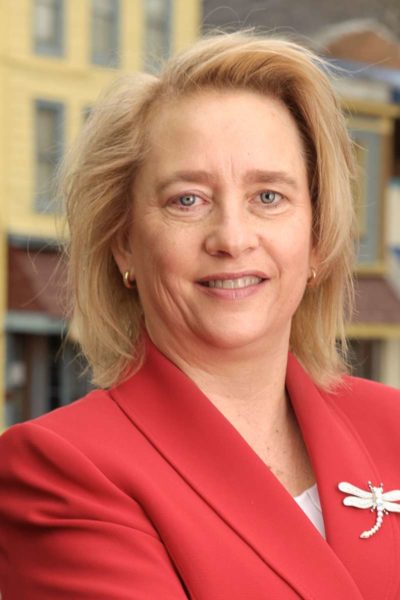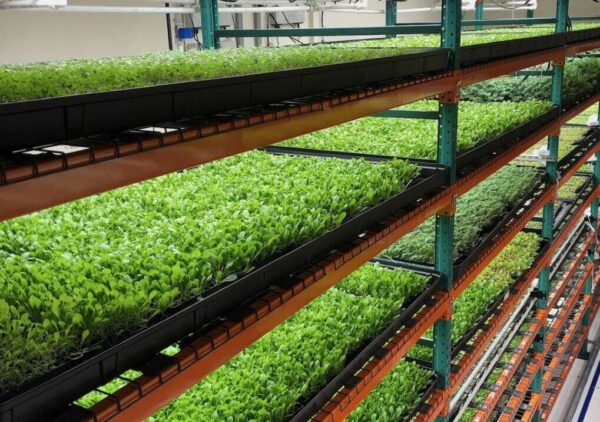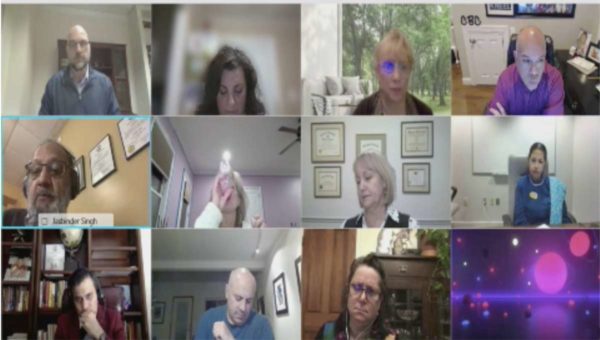(Updated at 2:10 p.m. on 5/27/2021) Beanstalk, an indoor vertical farming start-up, is putting down roots in Herndon with plans to invest more than $2 million to open a facility and farm this fall.
The Virginia-based company is expanding and opening a “scaled-up version” of their existing farm in the Lorton/Springfield area right off of Herndon Parkway and near the impending Herndon Metro station, Beanstalk co-founder Michael Ross writes Reston Now in an email.
The Herndon location will have research, growing, and package operations.
“This new facility will produce the equivalent of over 50 acres of traditional farmland and allow us to expand into more local grocery stores, farmers’ markets, and restaurants,” said Ross, who founded Beanstalk with his brother Jack.
The company grows pesticide-free leafy greens and herbs year-round using robotics and hydroponic — or soil-less — growing technology. It says it saves space by growing in layers and vertically as opposed to horizontally.
Beanstalk sells its salad mixes and herbs at grocery stores, local farmers markets, and online.
Jack Ross was selected by Virginia for a STEAM catalyst award back in 2018 for his development of an automated indoor growing production system. The technology allows Beanstalk to “produce food four times as efficiently as traditional hydroponic farming,” according to a press release from Virginia Gov. Ralph Northam.
The brothers opened their 3,000 square-foot Springfield/Lorton facility in 2018, and the company expects to have annual sales of over $5 million in the next three years.
“We have created a new technology that produces better tasting and more nutritious vegetables, herbs, and fruits than what are available today,” Ross said. “Our farms are also sustainable as they consume 95% less water, have zero chemical run-off, and are over 100 times more productive use of land.”
The company’s co-founders are in their 20s and both were raised in Alexandria, went to high school in D.C., and played youth sports across the region.
“I particularly spent a lot of time in Herndon and Reston in high school, which is how I originally got to know the area through events like the Herndon Festival,” said Ross, who studied aerospace engineering in college.
He tells Reston Now that they evaluated “dozens of cities” in the D.C. area for their expansion but decided on Herndon because of the town’s “incredible community” and prioritzation of sustainability.
“Herndon is a very unique place within Northern Virginia in that it feels like a small, close-knit town with all the benefits of a larger city,” he said.
Beanstalk is expected to create 29 jobs in Herndon, some of which are already open for hiring.
Positions currently open in Herndon include a director of research and a senior electrical engineer. Ross notes that other jobs will be available soon in engineering, research, and operations, and the company will be looking for farmers later this year.
“We look for people from all backgrounds who want to bring locally grown food to their community and are curious, ambitious, and skilled,” Ross said.
Beanstalk is receiving financial support from both the state and Fairfax County in the form of grants that total $200,000.
As expected, local leaders say they are thrilled that Beanstalk decided Herndon is the place for them to grow.
“We are always looking for innovative investments to move our economy forward in Fairfax County,” Fairfax County Board of Supervisors Chairman Jeffrey McKay said in the governor’s press release. “Beanstalk’s new facility will not only bring new jobs to the community, but it also is a creative solution to using advancements in technology to increase access to fresh food options.”
Herndon Mayor Sheila Olem also welcomed the Ross brothers and Beanstalk to town.
“Theirs is exactly the kind of innovative, jobs-producing business we are looking to attract to our town’s commercial sector, and we applaud their application of technology toward provision of healthy, locally-grown produce,” she said.
Beanstalk’s mission is not only to grow fresh produce using new, more-efficient, sustainable technology, but to provide food at its freshest, Ross says.
“By growing in a farm within the community, we deliver food at peak freshness, which ensures all the taste and nutrition of the food is there when you take your first bite,” he said.
Photo courtesy Michael Ross
Andria McClellan, a Democratic candidate for Virginia lieutenant governor, released a plan on Thursday (April 29) outlining her policy platform to support small businesses coming out of the COVID-19 pandemic.
In conjunction with the plan’s launch, McClellan visited the Town of Herndon to talk to Mayor Sheila Olem and community members about the state of local small businesses. The Herndon visit was a part of an ongoing tour of Northern Virginia and the state as early voting in the Democratic primary gets underway.
While visiting various town businesses, including Green Lizard Cycling and Great Harvest Bread Co., McClellan acknowledged the challenges many small businesses have faced during the COVID-19 pandemic, while praising the sense of community fostered by both town officials and residents.
“It’s great to see a community like Herndon where the community members came together and supported the local businesses and did the GoFundMe pages and things like that,” McClellan said. “Hearing from Mayor Olem about how their economic department was helped by folks from parks and rec calling all the small businesses and doing that reach out, it just makes me feel really good about the community.”
Currently a member of the Norfolk City Council, McClellan says her small business plan was shaped by her 30-plus years of experience volunteering, fundraising, and pursuing various business endeavors, including work with nonprofits and public sector work as well as two start-up ventures.
“What happens with small businesses that are independently owned, when they make money, they put it right back into the community where they’re working and where their people are working,” McClellan said. “So, supporting those businesses and those jobs also supports the greater community.”
Her plan focuses on reducing red tape to clarify and simplify certification processes while providing government support to communities requiring the help. She also wants to foster “local and regional small business ecosystems” by connecting small business owners to one another and resources.
McClellan’s plan also calls for more opportunities for new businesses that work with renewable energy sources and water quality and more state funding to expand access to capital for small businesses through microloans, mid-range capital, and seed funding.
She believes the state’s economy and tax revenues are in better shape than anticipated given the impact of the pandemic, but she emphasized that she remains concerned about what will happen to people “who have suffered greatly” when the federal eviction moratorium comes to a close.
“It’s great to see this thriving community here, but I think underlying in all of our communities, there are a lot of people who are still hurting,” McClellan said. “We’re going to see that in much greater detail the second half of this year and we’ve got to be prepared for it.”
McClellan faces Del. Hala Ayala, Del. Mark Levine, Sean Perryman, Del. Sam Rasoul, and Xavier Warren for the Democratic nomination to replace Lt. Gov. Justin Fairfax, who is running for governor. Voting for the Democratic primary concludes June 8.
The Herndon Town Council is in the process of reviewing initiatives to actively pursue and discuss.
The council met Tuesday night to discuss members’ proposed strategic initiatives for the town. The initiatives fell in five categories: fiscal, transparency, inclusion, reform and long-term.
Inclusion initiatives include sponsoring or encouraging multicultural festivals and enacting a long-term recruiting effort to have elected officials, appointed officials and senior staff representative of the cultural diversity.
“It’s a strength of our town, our diversity. It’s the beauty of our town,” Vice Mayor Cesar del Aguila said.
The inclusion initiatives also involve creating a greater excellence and vibrancy by developing unique multicultural activities and creating picnic areas from banks of waterways.
“The reason we brought this item here is Herndon itself is a minority majority community right now. And we want to celebrate the diversity we have,” Council member Pradip Dhakal said. P”We have the diversity, but we want to create a kind of unity in that diversity.”
Town manager Bill Ashton concluded from the council’s discussion that the town would pursue the creation of a multicultural board. The board will be a point of discussion after reviewing similar entities in Leesburg and Fairfax to bring a model back to the council.
Transparency initiatives encompassed five items for review. Those included ensuring audio and video recording for all meetings, dedicating resources for Freedom of Information Act (FOIA) requests and making all records available to the public. Another initiative included creating transcripts of town council meetings.
Following a discussion from the council members and Ashton, they agreed to temporarily table creating transcripts of meetings to first review state requirements and the town’s ability to do so.
“On the transcripts, I know there’s also state limitations and requirements as to where we have to store these things,” Mayor Sheila Olem said.
“It’s very easy to say that we’re just going to have exact transcripts, but we also need to get the pricing on these items and whether or not our current availability with where we’re required to store them is going to accept us morphing these things into much larger documents.”
Ashton added that his office would work to provide an analysis of what a closed meeting recording would look like now and when the council eventually returns to gathering in person. He also concluded that his office would review the requirements to improve the FOIA process.
Reform initiatives were broken into three portions: housing, operational and council.
The housing reform issues included a handful of initiatives under the Historic District Review Board (HDRB). Those initiatives are analyzing district definition and regulations, gaining a better understanding of what’s necessary to maintain a historic district status and reforming the historic overlay district.
Another housing reform initiative that was discussed was to gain a greater understanding of the housing price ranges in the town and the tools it has to implement housing policy. This initiative involves reviewing accessory dwelling units, workforce dwelling units, affordable dwelling units, and housing allowances for teachers and first responders.
The final points for housing reform included setting a benchmark of the housing stock in the town against the county and investing in Herndon’s current neighborhoods.
Ashton proposed putting together an informational discussion item for a future work session on the district to then define what reforming the historic overlay district would entail.
“As I’ve often said, you can’t get to where you’re going until you know where you are first, then you set your objective and charge your path,” Ashton said.
The operational reform initiatives included retraining and redeployment of staff, modernizing town staff presentations and examining community development regulations.
“Staff retraining and redeployment, for me, that’s just making sure – I know we do this to an extent – we have a well funded pipeline of development and training or education, certifications, for people on staff to either do lateral moves or upward moves and certainly continue that investment in our people,” del Aguila said.
Another portion of the operational reform is taking into account the timing of traffic lights to improve cross-town flow. Ashton clarified that this issue has been recognized and the town is undertaking two intersection projects this year to help alleviate some of the flow. One of the projects will be at Monroe Street and Elden Street and the other at Center Street and Elden Street.
The final portion of reform regarding the town council comprised of creating voting district, changing how the town council operates, and empowering the council to set its agendas.
After reaching a proposed deadline to end the meeting at 10 p.m., the council tabled discussion on fiscal and long-term initiatives for another 7 p.m. meeting on Feb. 9.
Long-term initiatives set to be discussed include an update on the 2035 Vision. Proposed initiatives also include reviewing funding of capital improvement plans for transportation, long-term regional effort to reduce cut-through commuter traffic, and investing in closing gaps in pedestrian and bicycle routes even when no developer funding exists.
Proposed fiscal initiatives to be discussed include undertaking effective short-term and long-term budgeting to match immediate and long-term needs without excessively inconveniencing town residents. Other initiatives gathered from the council encompassed protecting town staff from layoffs if practicable, utilizing reserves to offset budgetary shortfalls and possibly avoid raising taxes during “this financial crunch for citizens and businesses,” according to a presentation of the council members’ proposed initiatives.
A final fiscal point of discussion is focusing on services such as trash and recycling, road work and repair as well as water and sewer, and police functioning.
Image via Town of Herndon
Like other towns throughout the state and country, the Town of Herndon’s budget has been hit harder by the COVID-19 pandemic than counties as other larger municipalities.
But Jennie Tripoli, the town’s finance director, hopes things will “start to turn the corner” over the summer as vaccinations and warmer weather bring more normal conditions to the area.
At a recent Herndon Town Council meeting — the first session with newly-elected members and Mayor Sheila Olem — Tripoli said that the town had to sequester roughly $5.5 million in funding in fiscal year 2021. In the next fiscal year, the town hopes to transition from surviving to reviving itself.
The currently authorized budget for FY2021 is roughly $33.3 million, a figure that is short of projections by roughly $450,000. The town received $2.4 million in funding from the federal CARES Act.
But like other towns, Herndon was excluded from the latest round of federal funding.
The challenges posed by the pandemic are unique to the town. Unlike the county, the town relies heavily on excise taxes like the meals tax for funding.
The town took big hits in many sources of revenue. For example, revenues from fines and forfeitures decreased by 44 percent, when reductions of roughly 10 percent were originally anticipated. Similarly, fees from services for parks decreased by 91 percent instead of the original 56 percent decrease projected by staff.
As the town looks toward preparing the FY2022 budget, Tripoli cautioned that much is still uncertain about the budget, consumer habits, the path of the virus, and vaccinations.
So far, the county is expecting a three-percent increase in revenues from residential real estate taxes. However, a 10 percent decrease in non-residential retail and hotels, as well as local taxes like meals and transient occupancy, is still expected for the next fiscal year.
Fees from building inspections are also expected to normalize, she said.
“We’re still in unprecedented economic uncertainty,” she said, adding that the hope is “gradual recovery” begins in the summer of this year.
The town council is expected to hold additional work sessions on the budget later this month.
Image via Herndon Town Council

Vice Mayor Sheila Olem has officially been elected as the Town of Herndon’s Mayor, replacing Lisa Merkel, who announced she no longer plans to seek reelection after eight years in office.
Olem swept the election with roughly 61 percent of the total vote, according to election results that were formally released by the town today (Friday). She beat Roland Taylor, who secured 38 percent of the total vote.
The Town of Herndon formally announced results earlier today, but cautioned that Election results will be certified by the Fairfax County Electoral Board on Nov. 16.
Residents who served on past councils dominated the Herndon Town Council election, in which eight candidates sought six seats. Incumbents Cesar del Aguila, Pradip Dhakal, Signe Friedrichs and Jasbinder Singh will return to the council alongside newcomers Sean Regan and Naila Alam.
Olem will assume office on Jan. 1. A swearing-in ceremony is planned for new officials soon.
The following is a breakdown of unofficial results, per the state’s department of elections:
- Cesar del Aguila: 13.69. percent
- Pradip Dhakal: 13.48
- Sean Regan: 13.09
- Naila Alam: 12.36
- Signe Friedrichs: 12.14
- Clark Hedrick: 11
- Stevan Porter: 10.73
The certification of results could change the outcome of the town council race, which has traditionally been extremely tight.
Photo via Sheila Olem




